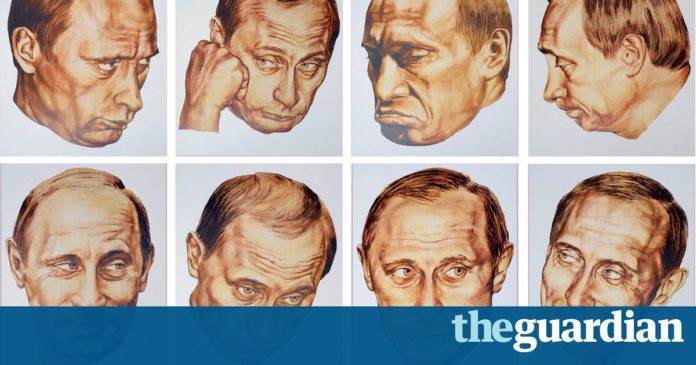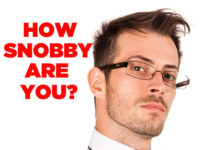The Long Read: Russias role in Trumps election has led to a boom in Putinology. But do all these theories say more about us than Putin?
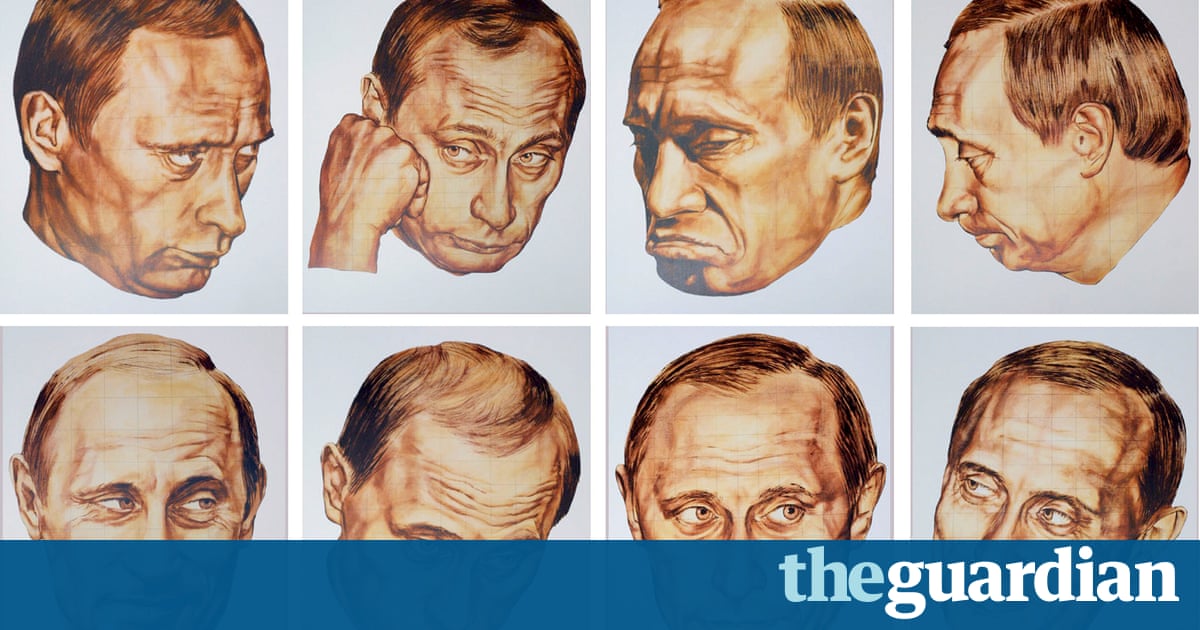
Vladimir Putin, you may have noticed, is everywhere. He has soldiers in Ukraine and Syria, troublemakers in the Baltics and Finland, and a hand in elections from the Czech Republic to France to the United States. And he is in the media. Not a day goes by without a big new article on Putins Revenge, The Secret Source of Putins Evil, or 10 Reasons Why Vladimir Putin Is a Terrible Human Being.
Putins recent ubiquity has brought great prominence to the practice of Putinology. This enterprise the production of commentary and analysis about Putin and his motivations, based on necessarily partial, incomplete and sometimes entirely false information has existed as a distinct intellectual industry for over a decade. It kicked into high gear after the Russian invasion of Crimea in 2014, but in the past few months, as allegations of Russian meddling in the election of President Donald Trump have come to dominate the news, Putinology has outdone itself. At no time in history have more people with less knowledge, and greater outrage, opined on the subject of Russias president. You might say that the reports of Trumps golden showers in a Moscow hotel room have consecrated a golden age for Putinology.
And what does Putinology tell us? It turns out that it has produced seven distinct hypotheses about Putin. None of them is entirely wrong, but then none of them is entirely right (apart from No 7). Taken together, they tell us as much about ourselves as about Putin. They paint a portrait of an intellectual class our own on the brink of a nervous breakdown. But lets take them in order.
Theory 1: Putin is a genius
Its simple: while the world is playing checkers, Putin is playing chess. He seized Crimea from the Ukrainians with barely a shot fired; he got back Yalta, the favoured beach resort of Chekhov and the tsars, and all he faced as punishment were some minor sanctions. He intervened on behalf of the Assad regime in Syria, after the US, Turkey and the Saudis spent years supporting the rebels, and in short order turned the tide of the war. He has been instrumental in undermining the pro-EU consensus, financing the Eurosceptic right and, where convenient, the Eurosceptic left aiming apparently to dismantle the postwar international order and replace it with a series of bilateral transactional relationships in which Russia can, for the most part, be the senior partner.
Finally, he interfered in the US election, the election for the most powerful post in the world, and managed to get his man in the White House. And what were the consequences? A few diplomats expelled from the United States is a small price to pay for a potential end to US sanctions, a renewal of economic ties and joint oil-drilling in the Russian Arctic, and the de facto acknowledgment of Crimea as part of the Russian Federation.
Domestically, Putin has managed to silence or coopt almost all opposition. The liberals squabble among themselves on Facebook and emigrate; the far right, which hates Putin for his refusal to go full fascist and, for example, take Kiev, is kept on a tight leash; and the democratic socialist left, hobbled by the massive pseudo-left authoritarian Communist Party of the Russian Federation, is so tiny Putin can hardly even see it (and he has many eyes).
Putin during his first two terms enjoyed immense luck in the form of a worldwide commodities boom, but he could have blown that luck. Instead, he husbanded it, and Russia grew rich. Now the closest thing to a rival to Putin within his inner circle is his prime minister, the pudgy and diminutive Dmitry Medvedev, who has distinguished himself primarily as a man who enjoys playing with his iPad. The lone domestic politician who has mounted a plausible threat to Putin is Alexei Navalny, a talented Moscow-based digital populist of variable political convictions, whom the Kremlin is keeping busy with various criminal charges and house arrests.
Putin-as-evil-genius is, unquestionably, the primary theoretical view in the west of the Russian president, whether by his multitude of critics or his smattering of admirers. Those who take a more jaundiced view of Putins political, intellectual, and military capabilities President Barack Obama, for one are treated as naive, soft on Putin: the sort of people who play checkers, not chess. Meanwhile, most Russian observers of Putin tend to be surprised at the western awe of his overwhelming strategic prowess. Garry Kasparov, for example, the great chess champion and not-so-great opposition politician, finds the whole thing insulting to chess.
In any case, one does wonder about this genius business. Was it really worth international isolation, increasingly bothersome sanctions and the eternal enmity of the Ukrainian people to seize a beloved but past-its-prime resort area that Russians dont even really visit any more? There was fear that the post-Maidan government of Ukraine might cancel the lease on the large Russian naval port in Sevastopol, but surely a genius might have handled the threat through something short of seizing the entire peninsula?
As for Syria, Putin may bask for now in the glory of rescuing the Assad regime, but who will celebrate this glory with him? Certainly not Sunni Muslims, whom Assad has been slaughtering some of those who survive will soon return to their homes in the Caucasus and Central Asia, newly angry at the Russian bear. As for the disintegration of the EU, which Putin seems to seek almost above all else, is this really a winning formula for Russia? The Hungarian Putin, Viktor Orbn, is so far well-disposed toward Russia, but what we might call the Polish Putins of the Law and Justice party are committed Russophobes. And, as one shrewd commentator has pointed out, should Putin ever succeed in installing a rightwing nationalist leader in neighbouring Germany, that German Putin may well decide to go to war with the original Putin, as German Putins have always tended to do in the past.
And even our new American Putin, Donald J Trump, may not be as much of a boon to Russia as he seems at first glance. For one thing, Trumps apparent romance with the Russian president has ignited a storm of Russophobia in the US, the like of which has not been seen since the early 1980s. For another, Trump is a fool. It is not the way of genius to hitch your wagon to a fool.
On the domestic front, Putins genius now seems equally suspect. In 2011, he made the momentous decision to return to the presidency after ceding it for four years to Medvedev. The decision, announced in a humiliating manner by Medvedev himself, was soon followed by the largest protests in Moscow since the early 1990s. Putin was impressive in waiting the protests out. He did not make the mistake that Viktor Yanukovych made two years later in Ukraine by first overreacting and then, perhaps, underreacting to the situation. Instead, Putin let the protests lose steam and then picked off the protest leaders one by one with surreptitiously videotaped provocations and phony criminal charges, while Moscow itself underwent a kind of urban renaissance, complete with public parks and bike lanes, to assuage some of the anger of the creative class. But Putin did nothing to address the substance of the criticism coming from the opposition that his political regime was corrupt, unresponsive, and that it had no vision. Instead, with the invasion of Ukraine and the subsequent nationalist mobilisation, he doubled down on the worst aspects of his reign.
Had Putin retired after 2008, as he said he would, and become a grand old man of Russian politics, there would have been statues built to him throughout the country. Under him, Russia had emerged from the chaos of the 1990s into a relative stability and prosperity. Now, however, with low oil prices, a collapsed rouble, risible counter-sanctions in place on European cheese, and a demoralised opposition, it is hard to imagine an end to the Putin era that is not violent, and whose violence does not lead to more violence. If this is genius, then it is of a very peculiar kind.
Theory 2: Putin is a nothing
The first sight many Russians got of Vladimir Putin was on New Years Eve, 1999, when in a remarkable turn of events, a clearly ailing Boris Yeltsin, with six months left in his term, used his traditional televised end-of-year address to announce that he was resigning the presidency and handing the reins to his recently appointed, younger and more energetic prime minister.
Then Putin came on. The effect was startling. Yeltsin had looked confused and sickly. His speech was so slurred that he was hard to understand. He sat bolt upright as if wearing a brace. But this? This homunculus? Putin was tiny compared to Yeltsin, and though younger and healthier, he nonetheless managed to more closely resemble death. He spoke for a few minutes, promising on the one hand to keep Russian democracy strong, but on the other hand issuing various warnings to those who would threaten Russia an incongruous performance. Many people didnt think it was likely that Putin would last very long in this august seat. For all his faults, Yeltsin was at least a someone: tall, with a booming voice, a former member of the Soviet Politburo. Whereas Putin? He was, people suddenly scrambled to learn, merely a colonel in the KGB. He had been sent abroad, but only barely to the East German backwater of Dresden. He was short and had a squeaky voice and his hair was thinning. He was a nonentity even among the nonentities who remained after Yeltsins perpetual clearing-out of his cabinets.
In a world where most people are convinced that Putin is a genius, this theory of Putin as a nobody deserves a second look. There really is an everyman quality to Putin. One of my favourite observations about him comes from a man who knew him back in St Petersburg in the 1990s. The man became a whistleblower after the successful medical supplies company he ran was asked, not long after Putin became president, to divert a portion of its earnings into the fund for Putins Palace, a huge complex going up on the Black Sea. But he had an interesting take on the president as he had known him before, as he told the British journalist Ben Judah:
He was an absolutely average man His voice was average not tough, not high. He had an average personality average intelligence, not especially high intelligence. You could go out the door and find thousands and thousands of people in Russia, all of them just like Putin.
This cant be entirely right: Putin was above average in at least a few respects (he was the judo champion of Leningrad, for one). But there is insight in these words. It was part of Putins charm that he didnt stand out. During his first interviews in office he stressed how much of a regular guy he was, how he had struggled financially during the 1990s, how much tough luck hed had. He knew all the same jokes, had listened to all the same music and seen all the same movies, as everyone else of his generation. It is a testament to the power of Soviet culture, to both its egalitarianism and its limitations, that when Putin mentioned a line from a quasi-dissident song or movie of the 1960s or 1970s, almost everyone knew exactly what he was talking about. This did not put him out of the mainstream. He was the unremarkable only child of an unremarkable working family from Leningrad. It was almost as if the Soviet Union had coughed up, from the great mass of its humanity, this average exemplar, with his average aggressiveness, his average ignorance, his average nostalgia for the way things were.
Accounts of Putins early years in office tend to confirm that he was something less than a colossus. He was impressed by the might of the American empire and awed by George W Bush. He was aware, too, of how limited his domestic power was. Russian politics during the Yeltsin era had been dominated by a small group of oligarchs, oil and banking titans with their own private armies. These were led not by short, skinny former colonels like Putin, but by barrel-chested former generals of the Interior Ministry and KGB. Whats more, some of the oligarchs were brilliant strategists they had survived the ruthless 1990s and emerged victorious, while Putin had muddled along as the corrupt deputy to a one-term mayor. Putins early popularity was based on his tough attitude towards Chechens and oligarchs. He had succeeded in levelling Chechnya, but could he really win in a showdown with the oligarchs? He had no idea.
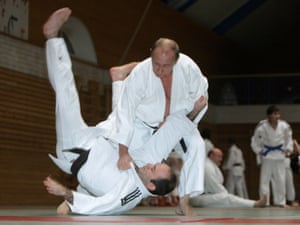
In 2003, in one of the main turning-points of his reign, it took Putin months to work up the nerve to arrest Mikhail Khodorkovsky, the countrys richest man. But then he did it, and it worked. No people rose up in the streets to defend the fallen oligarch, no secret armies emerged from the forests. Putin got away with it, and he would get away with much more. He would grow into his office. Today you see tiny Putin walking through the cavernous chambers of the Kremlin during official ceremonies, and clearly his stature has not risen to the grandeur of his surroundings. But time itself has done its work. When he meets Trump, it will be his fourth US president. Numerous British prime ministers have left office, along with two French presidents and a German chancellor (whom, in a less than proud moment for the German people, Putin later hired). Putin remains. A kind of stature accrues to him just from surviving. A middling stature.
Theory 3: Putin had a stroke
This early classic of Putinology was popularised in a 2005 Atlantic article titled The Accidental Autocrat, which cited the work of a behavioural research fellow at the Naval War College in Rhode Island named Brenda L Connors. After studying film of Putins movements, Connors concluded that he had a debilitating and likely congenital neurological deficiency, possibly caused by a stroke in utero, which prevented him from having full use of the right side of his body which is why his left arm swings more than his right when he walks. Connors told the Atlantic that it was unlikely that Putin had ever crawled as an infant and that he still moves with his entire body, in a head-to-tail pattern, like a fish or a reptile.
The explanatory power of this hypothesis in terms of predicting whether Putin will, for example, invade Belarus, is low, but nonetheless it is haunting. One pictures little fish-like Putin moving through the world of men and women who have use of both sides of their bodies, and he, without that ability, feeling sad.
Theory 4: Putin is a KGB agent
After his famous first meeting with Putin, the newly elected President George W Bush declared at a press conference that he had looked into the Russians eyes and seen his soul. His advisers were mortified. I visibly stiffened, national security adviser Condoleezza Rice wrote in her memoirs. Secretary of state Colin Powell pulled his president aside. You may have seen all that in his eyes, Powell told W, but I still look in his eyes and I see K-G-B. Remember, he added ominously, theres a reason hes fluent in German. Vice President Dick Cheney felt the same way: Every time he saw Putin, he told people, I think KGB, KGB, KGB.
And ever since then, its been the same way. Whenever Putin tried to be nice to someone, it was because he was a KGB agent, manipulating them. And whenever he was mean as when he introduced a dog-fearing Angela Merkel to his black labrador retriever Connie this, too, was because he was a KGB agent, angling for psychological advantage.
That the KGB formed the bulk of Putins professional experience is beyond doubt he worked there from the day he graduated college in 1974 until at least August 1991. And, what is more, the KGB was not just a company, but a university: at the Higher School of the KGB, in Moscow, which Putin attended, young agents took university-level classes. It was important, the KGB higher-ups believed, that the cadres understand the world they were being trained to subvert and manipulate. It is entirely likely that Putin kept in touch with his former KGB associates after 1991, while serving in the St Petersburg mayors office. And it is true that Putin has brought many of his former KGB colleagues with him to the highest levels of government.
And yet I cant help but find the KGB hypothesis unsatisfying. When people such as Rice and Powell and Cheney speak of Putins KGB past, they are suggesting that he treats politics as essentially a contest in manipulation. People are either his agents, whom he is running, or his adversaries, whom he is trying to weaken. This is a ruthless worldview, but dont many people in politics act this way? Arent there a lot of bullies who divide people into those they can control and those they cant? Isnt that how Dick Cheney operated, for example? That doesnt make it an acceptable way to go through the world. It just doesnt seem particularly unique to the KGB.
But the KGB label has other uses in western mouths. It is synecdoche for the Soviet Union, and Putin-as-Soviet-revanchist, with a hammer in one hand and a sickle in the other, is one of his chief avatars in the western press. What exactly is meant by this? Certainly not that anyone thinks Putin supports a historic union of the proletariat (the hammer) and the peasantry (the sickle), nor that he is an actual communist who wants to expropriate the bourgeoisie. Rather the USSR is meant here in its aspect as an aggressive imperial power that occupied half of eastern Europe. And it is true that Putin seems to feel about the countries on the Russian periphery that they are not full countries with rights and sovereignty its fair to say he is an imperialist. What is unfair (to the Soviet Union, really) is to suggest that his imperialism is specifically Soviet in nature. The Soviets did not invent imperialism; the Russian Empire, for example, whose basic geography the Soviets managed to keep intact, did not become an empire by not conquering native Arctic peoples, prosecuting brutal decades-long wars in the Caucasus, and lopping off parts of Poland. Putin is a Russian imperialist, full stop.
But finally, of course, there is a moral connotation to saying that someone is KGB, because the Soviet KGB carried out assassinations, harassed and imprisoned dissidents, and was one of the pioneers of what came to be known as fake news. But the idea that anyone who walked its halls was pure evil is as blinkered as the KGBs own idea of itself as the one uncorrupted, professional institution in late Soviet life.
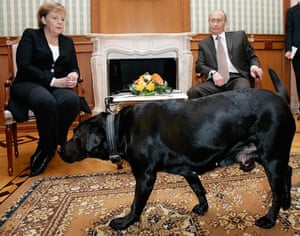
The KGB was a giant organisation in the 1980s it employed hundreds of thousands of people. After it started shedding staff in the 1990s, we learned that KGB agents came in all shapes and sizes. There was Philipp Bobkov, for example, who once persecuted Soviet dissidents, but who after the Soviet Unions collapse became an employee of the media oligarch Vladimir Gusinsky and a thoughtful commentator on the old KGB. Other KGB agents went into the private sector as surveillance specialists or hired assassins. There were KGB agents who stayed on with the FSB and tried to fight organised crime. There were KGB agents who stayed on with the FSB and used their positions to abet organised crime, to murder innocent citizens, and to amass small private fortunes. There were former KGB agents who fought bravely in Chechnya and there were former KGB agents who committed war crimes there. There was Alexander Litvinenko, the KGB agent turned FSB agent who was ordered by his corrupt superiors to kill the oligarch Boris Berezovsky, and who instead of doing so went public. Eventually in fear for his life he fled the country, settling in London where he cooperated with western intelligence agencies and published numerous anti-Putin broadsides. Years later, he was poisoned by a large dose of Polonium-210 in London by another former KGB agent, Andrei Lugovoi.
Theory 5: Putin is a killer
Though I now live in New York, I was born in Russia and sometimes write about Russia. This means that people often share their opinions of Putin with me. I remember one evening in March 2006, when I was introduced to a well-known French photographer. Upon learning that I was Russian, she said, Pou-tine? The French pronunciation was emasculating to the Russian President, making him sound like those Canadian french fries with gravy on them. Pou-tine, said the photographer, is a stone-cold killer.
I had heard this opinion before from some Russian oppositionists, but it was the first time I had encountered it in New York. Perhaps because the photographer was French, or perhaps because she was a photographer, the opinion struck me as primarily aesthetic: Putin was a killer because of his cold, bloodless face, his expressionless eyes, his refusal to smile. A few months later, Litvinenko was poisoned in London, and the journalist Anna Politkovskaya was shot while returning home with some groceries in downtown Moscow. The view that Putin was a killer became much more widespread.
I have no wish to dispute that characterisation here. Putin has launched violent, deadly wars against Chechnya, Georgia and Ukraine, and I agree with the recent British inquiry that concluded that Putin probably approved of the assassination of Litvinenko. But the launching of aggressive wars and the killing of a former operative who has defected are hardly the sort of thing that will get you kicked out of the international community.
No, there is another sense in which Putin is believed to be a murderer; it was the subject of much discussion in the United States during the strange rise of Donald Trump. During the Republican primaries, the conservative TV host Joe Scarborough, otherwise famously cosy with Trump, pressed the candidate about his sympathies for Putin who, in Scarboroughs words, kills journalists and political opponents. A few days later, on a more prominent Sunday-morning politics programme, the former White House adviser George Stephanopoulos challenged Trump again. When Trump protested that nobodys proven that hes killed anybody, as far as Im concerned, Stephanopoulos confidently replied: There have been many allegations that he was behind the killing of Anna Politkovskaya. Trump parried as best he could. But the issue obviously hasnt gone away. In an interview before the Super Bowl in early February, Trump was confronted by Fox blowhard Bill OReilly. Putins a killer, said OReilly, to which Trump infamously (though accurately) responded, There are a lot of killers. Weve got a lot of killers. What do you think? Our countrys so innocent?
I dont know of any government leaders that are killers, said OReilly. He did not mean that he didnt know of any government leaders who had ordered the invasion of Iraq or who had signed off on dozens of drone strikes or shoot-to-kill missions such as the one that ended the life of Osama bin Laden. He meant that he didnt know of any leaders who went around killing regular folks.
The trouble with this accusation is not that it is false, but that, like most Putinology, it is sloppy. When most people accuse Putin of killing journalists and political opponents, they mean Politkovskaya, killed in 2006, and the opposition leader and former deputy prime minister Boris Nemtsov, killed in 2015. Allegations that Putin was behind the killing of Politkovskaya and Nemtsov do exist but very few people with knowledge of the cases believe them. What they do believe is that Politkovskaya and Nemtsov were killed by associates of Ramzan Kadyrov, the violent dictator of Chechnya. In the Nemtsov case, the evidence for the involvement of people close to Kadyrov is overwhelming. In the Politkovskaya case, it is more circumstantial (and with Politkovskaya there is considerable evidence of other efforts to harm her, including an earlier poisoning attempt that looked more like a government operation), but still the most likely scenario.
And yet Kadyrovs involvement does not absolve Putin, because Kadyrov works for Putin. It has been widely reported that Putin was baffled and angry over the Nemtsov killing and refused for weeks to take Kadyrovs phone calls. On the other hand, here we are almost two years later, and Kadyrov is still in charge of Chechnya. He was put there by Putin. So if Putin did not directly order these killings and, again, it is the consensus view among most journalists and analysts that he did not he nonetheless continues to work with and support those who did.
With Putin the killer, we reach something like Putinologys conceptual blind spot. What we seem to be dealing with, in Russia, is neither a failed state, where the government has no power, nor a totalitarian state, where it has all the power, but something in between. Putin does not order killings, and yet killings happen. Putin ordered the takeover of Crimea, but, as best as anyone can tell, he seems not to have ordered the invasion of eastern Ukraine. That invasion appears to have been undertaken as a freelance operation by a small group of mercenaries funded by a well-connected Russian businessman. Real Russian troops came later. But if Putin isnt in charge of everything if there are powerful forces operating outside of Putins say-so whats the point of Putinology? On this point, Putinology is silent.
The absolute worst crime of which Putin has been accused is the bombing of several apartment blocks in Moscow in 1999. In September of that year, with President Boris Yeltsin ill, presidential elections just around the corner, and a relatively unknown Putin recently moved from heading the FSB to running the government as Yeltsins prime minister, two large apartment buildings blew up in Moscow, killing nearly 300 people. A few days later there was another building explosion, this time in the southern city of Volgodonsk. And a few days after that, in a bizarre incident, some men were caught by local police planting what appeared to be explosives in the basement of a building in Ryazan the men turned out to be from the FSB. They quickly removed the apparent bomb and declared the whole thing a training exercise meant to test the vigilance of the populace and the police.
Though the government immediately accused Chechen terrorists of planting the bombs, and used this as justification for its invasion of Chechnya, a persistent minority has always insisted the government itself was responsible. (Litvinenko was one of the earliest and most vocal proponents of this theory.) A public commission to investigate the allegations was set up by the Soviet chemist turned dissident Sergei Kovalyov. Two members of the commission, Sergei Yushenkov and Yuri Shchekochikhin, were killed in 2003. Yushenkov was shot outside his apartment building; Shchekochikhin was poisoned.
The question of the Russian governments involvement in the bombings has remained a vexed one. The most authoritative account of the available evidence was written up a few years ago by John Dunlop of the Hoover Institute. While careful not to claim to have settled the case definitively, Dunlop argued that there is compelling evidence that the bombings were ordered by the Yeltsin inner circle and carried out by the FSB.
And yet here, too, Putin evades us. If the apartment bombings really were a palace plot, it was not Putins palace but Yeltsins that plotted them. And indeed the political killings that seem to characterise the Putin years also characterised the Yeltsin ones. This does not, again, absolve Putin of anything. But it points to a longer and more complex period of violence, of groups inside and outside the government employing assassination and terror as a political weapon, and not just the machinations of one evil man. If Putin, as president, is unable to stop this violence, then maybe someone else should be president; if Putin, as president, is a party to the violence, then certainly someone else should be.
But on our end, it behoves us to be judicious. The practitioners of Putinology are maddeningly imprecise, and in no area of Putinology is their imprecision more damaging. When George Stephanopoulos appears on national TV and declares that Putin ordered the killing of Anna Politkovskaya, it makes it that much harder to pin the blame on Putin for things that he did, demonstrably and undoubtedly, do.
Theory 6: Putin is a kleptocrat
Until around 2009, the complaints of Putins liberal critics in Russia, amplified by western journalists and statesmen, centred on his abuses of human rights. He was the censor of the Russian media, the butcher of Chechnya, a total stick in the mud during our glorious invasion of Iraq, the killer of Litvinenko, and the invader of Georgia. It took the anti-corruption activist Alexei Navalny to fundamentally shift the discourse around Putin away from these abuses and towards something else: the theft of Russians money. Navalny, a corporate lawyer and online anti-corruption activist, concluded that in contemporary Russia, human rights was not a winning issue, but money was. (He memorably dubbed Putins United Russia a party of crooks and thieves.) In this account, soon taken up by western Putinologists, Putin was no longer a scary monster but something simpler and more manageable: a thief.
The accusation had the virtue of being unquestionably true. Either that, or a surprising number of Putins old friends were business geniuses, because in the period since he came to power, they had become billionaires. It was one thing for the Berezovskys and Khodorkovskys and Abramoviches to emerge from the vicious scramble of the 1990s with billions in their pockets certainly they could not have made those billions were it not for their proximity to the Yeltsin regime, but they also had to survive the wilds of early Russian capitalism. They were geniuses of a kind. Whereas the only genius ever demonstrated by Putins billionaire friends was befriending the future president of Russia.
If Putin liked his friends (which he seemed to) and if his friends liked lining their pockets (which they definitely did), then it followed that hitting Putins friends in their wallets would cause Putin to pull back from some of his more outrageous foreign policy gambits, most notably in Ukraine. This was the genesis of the targeted sanctions imposed in 2014 by the US and EU against Putins inner circle.
If we do not hear so much anymore about Putins kleptocracy, it may be because these sanctions failed to alter the behaviour of Putin on the world stage. No doubt Putins friends, and Putin himself, did not enjoy the sanctions: Putins friends because they were no longer allowed to travel to their favourite vacation spots in Spain; Putin because the sanctions put him beyond the pale of the international order. It was embarrassing.
But this did not stop Putin from stalling and undermining the Minsk accords meant to halt the fighting in eastern Ukraine, nor did it stop Putin from pursuing his brutal intervention in the Syrian civil war. If Putins friends were begging him to come to his senses, he wasnt listening. More likely, Putins friends knew that they had been the beneficiaries of his largesse, his unlikely rise to power, and that they had to support him, come what may. Kleptocrats are not the types to organise successful palace coups. For that, you need true believers. If there is a true believer among them, he has yet to show his face. In fact, it appears the closest thing to a true believer is Putin himself.
Putin lives a fairly modest day-to-day existence. Yes, he has a palace on the Black Sea, built with pilfered funds, but he doesnt actually live in it. In fact, it is unlikely that he will ever live in it. The palace is, in a way, the most hopeful thing that Putin is building a promise of his eventual retirement, and under circumstances where he is not torn from limb to limb by a mob that has entered the Kremlin and overpowered his personal guards.
Theory 7: Putin is named Vladimir
A recent article published on the website of a respected American magazine warned readers that the end of communism doesnt mean that Russia has dropped its primary mission of destabilising Europe, and described Putin as a former KGB agent who, it is no accident, shares the name Vladimir Ilyich with Lenin. When it was pointed out that Putin does not, in fact, share the name Vladimir Ilyich with Lenin his name is Vladimir Vladimirovich Putin the article was corrected to say that it is no accident that Putin shares the name Vladimir with Lenin. If it is not an accident, this may be because it is one of the most common Russian names. But still, it cannot be denied. Both Putin and Lenin are named Vladimir.
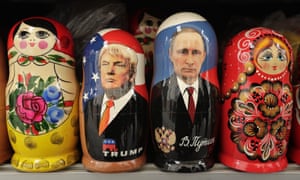
The Putin-is-named-Vladimir hypothesis is either the historic high point of Putinology, or its nadir, depending on your perspective. But the confident proclamation of expertise by someone who does not technically know Putins name is surely a sign of something. Its a sign that most Putinology is not and has never been about Putin. In the weeks before and after the Trump inauguration, the outpouring of Putinalysis was a function of wanting to wish Trump away, to blame him on someone else. Surely we could not have elected this bigoted idiot-narcissist surely he must have been forced on us from somewhere else.
There is no reason at this point to dispute the consensus view of most intelligence analysts that Russian agents hacked the DNC and then leaked the emails to Julian Assange; it is also a well-known fact that Putin hated Hillary Clinton.
Furthermore, it is true that the election was very close, and it did not take much to tip the result to one side. But it is also essential to remember that there was hardly anything damaging in the leaked DNC emails.
Compared to the 40-year cycle of US deindustrialisation, during which only the rich gained in wealth; the 25-year rightwing war on the Clintons; the eight-year-old Tea Party assault on facts, immigration and taxes; a tepid, centrist campaign; and a supposed late-breaking revelation from the director of the FBI about the dubious investigation of Clintons use of a private email server well, compared to all those factors, the leaked DNC emails must rank low on the list of reasons for Trumps victory. And yet, according to a recent report, Hillary Clinton and her campaign still blame the Russians and, by extension, Barack Obama, who did not make a big issue of the hacks before November for her electoral debacle. In this instance, thinking about Putin helps not to think about everything else that went wrong, and what needs to be done to fix it.
This evasion is the essence of Putinology, which seeks solace in the undeniable but faraway badness of Putin at the expense of confronting the far more uncomfortable badness in front of ones face. Putinology predates the 2016 election by a decade, and yet what we have seen in connection to Trump these past few months has been its Platonic ideal.
Here in front of us is a man Donald J Trump who has said countless cruel and bigoted things and proposed cruel and bigoted policies, who is a pathological liar, who has failed in almost everything he has ever tried and who surrounds himself with conmen and billionaires. And yet, day after day, there is breathless excitement over each new data point in the effort to uncover Trumps secret/hidden connections to Russia each one inflated by the hope that this, now, finally, will render him illegitimate, remove him from the White House, and end the liberal nightmare of having actually lost an election to this hateful dope.
If Donald Trump is impeached and imprisoned for conspiring with a foreign power to undermine American democracy, I will celebrate as much as the next American. And yet in the long run, the Russia card is not just bad politics, it is intellectual and moral bankruptcy. It is an attempt to blame the deep and abiding problems of our country on a foreign power. As some commentators have pointed out, it is a page from the playbook of none other than Putin himself.
Follow the Long Read on Twitter at @gdnlongread, or sign up to the long read weekly email here.
Read more here: http://www.theguardian.com/us

